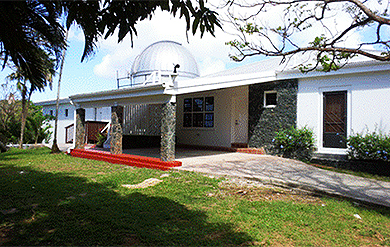
The University of the Virgin Islands is one step closer to having the first four-year physics and astronomy degree, thanks to the award of a five-year, $2.7 million grant from the National Aeronautic and Space Administration (NASA). The grant is part of NASA’s Minority University Research and Education Program (MUREP). UVI is one of only 10 schools in the United States to be awarded the grant in 2015.
The grant is designed to expand aerospace research and development, increase participation by faculty and students at minority serving institutions, and ensure that underrepresented and underserved students participate in NASA education and research projects to assist their pursuit of science, technology, engineering, and math (STEM) careers. UVI will use the grant to hire two new faculty to support the existing physics program, among other activities.
“This major accomplishment brings UVI closer to having a vibrant, sustainable, and expanding astrophysics program,” said UVI President David Hall. “This grant will also provide the necessary teaching and research capacity to move ahead with the development of a Bachelor of Science degree in physics.” The new bachelor of science degree in physics and astronomy is expected to begin in Fall of 2016.
The new grant will also benefit the ongoing work at UVI’s Etelman Observatory, Dr. Hall said.
According to David Morris, assistant professor of physics and director of the Etelman Observatory, UVI and the Etelman Observatory are fast becoming recognized as a vital new partner in NASA’s goal to nurture and develop a new generation of scientists.
Through a previously-received NASA EPSCoR research grant, UVI hired its first-ever research astrophysicist, who is a resident at the observatory, and funded 11 UVI undergraduate fellowships over the past two years. Six of those fellowships have been at NASA’s Goddard Space Flight Center.
“We are excited to be a part of this new grant and we are deeply grateful for the support we receive both from NASA and the UVI community. We look forward to the exciting new opportunities in astrophysics that lay ahead for UVI and for the Virgin Islands,” Morris said.

